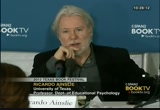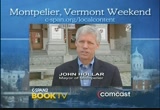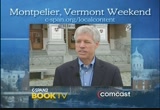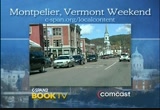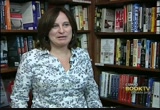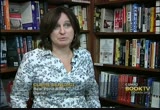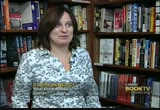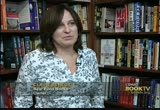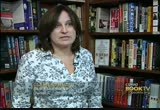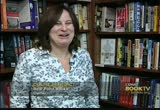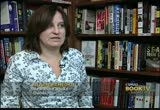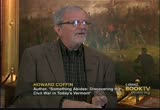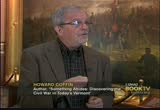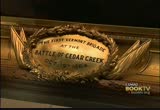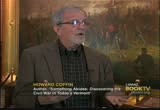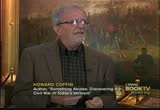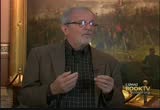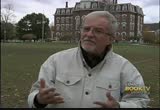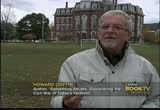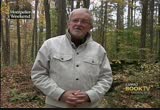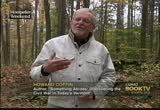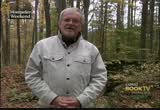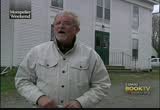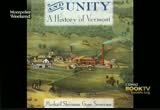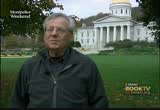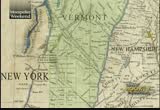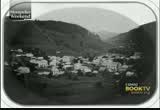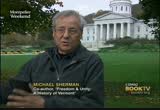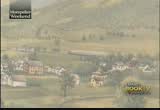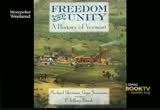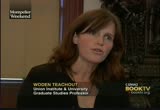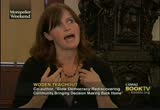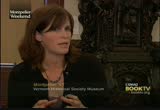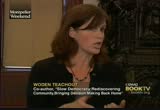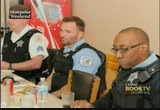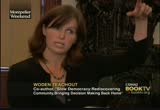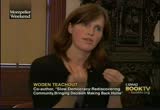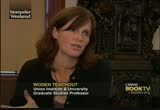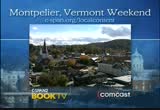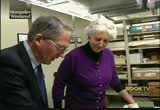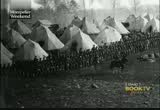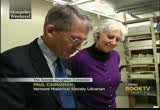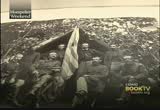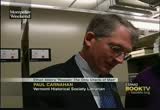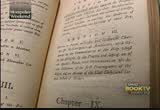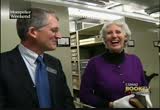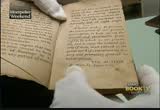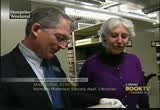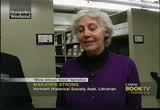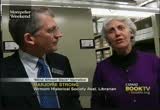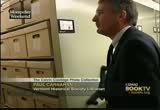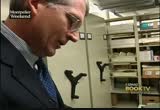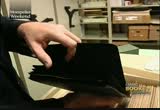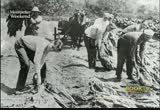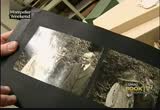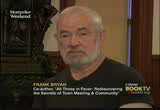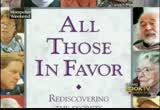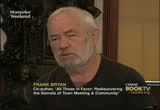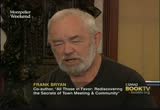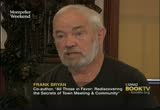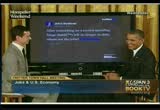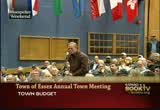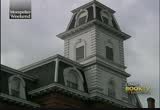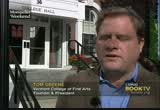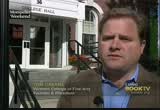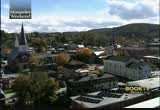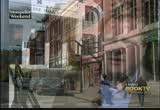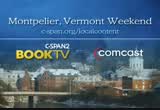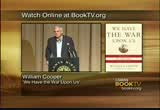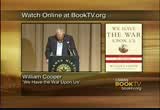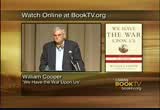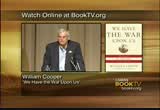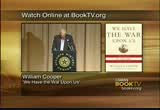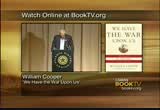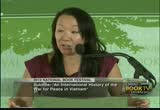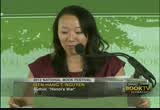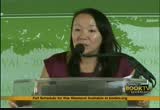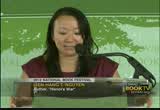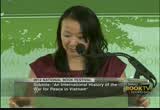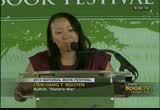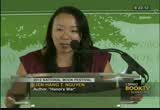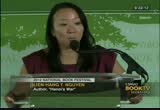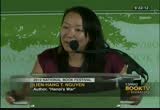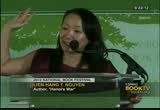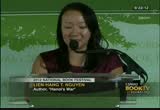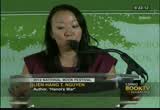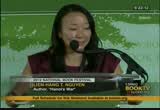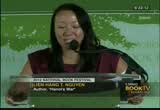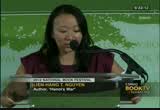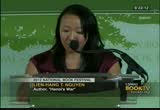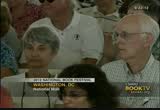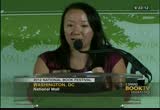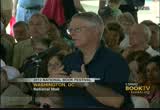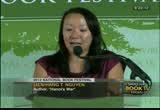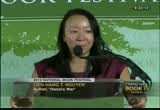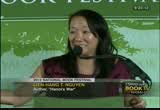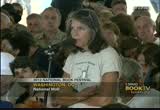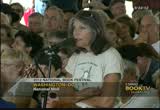tv Book TV CSPAN November 3, 2012 12:00pm-2:00pm EDT
12:00 pm
12:01 pm
>> are insurance companies do well and we are relatively protected from the national economy. we are a tourism-based community. in fact, our downtown buildings almost all full. we are very optimistic to the brink of our downtown and new testament presents for people who want to visit your. >> i would say that we have a vibrant business community. but it is virtually all independent. modulator really does value the independent nation.
12:02 pm
we are the only part of the country that doesn't have a mcdonald's. and it is a testimony to the citizens. they banded together and made it clear that this is not the kind of business that we wanted. and that was the outcome. so there is a real sense of independence, and i think that is what you see here. a value of among the people who live here to shop locally, and you see that today. >> welcome to montpelier, vermont. with the help of our comcast partners. for the next hour, we will travel the area in and around this capital city. coming up, visits to programs that this is a community that values writing and reading. >> later to the vermont college of fine arts to see how a city of only 8000 supports three independent bookstores in the writing program.
12:03 pm
>> when i first moved here, someone tell me you have to be careful about driving around on the back roads because novelists are all over the road like dear. >> and we will talk about the collections in the local authors all of this as comcast and booktv take you to montpelier, vermont. >> probably what we are known for is her squeaky floors for it we have these great wood floors to make a ton of noise and our customers love it. it is a little bit wonderful. we listen to it all day long. we are not a superstore or a slick store. the squeaky floors represent this kind of very old store.
12:04 pm
you don't get this kind of thing in a lot of communities anymore. we are an independent bookstore, we have been here since 1973. i have owned the store since 2006 come along with my husband. it was opened in 1973 across the street. and it has been part of the community ever since. they moved the store after a flood in 1992 when the old store got flooded. they want to start afresh place and it has been here ever since. it is really a community bookstore. people have been coming here since the beginning. kids have grown up here. and we definitely like being part of the community that way. i don't think you can find too many towns that support free three bookstores. a one-time we had five bookstores in downtown montpelier. all within a stone's throw of each other. >> mostly independent bookstores are closing around the country.
12:05 pm
a lot of them are closing, even though the summer opening. a lot of stores have been in business from a sportier cytosine not surviving changes of ownership. this is a community that values books and reading. we have a lot of writers. it is also a community beyond that the values independent stores. it really makes a huge difference. if a barnes & noble had come into town 20 years ago, i don't know if we would still be here. but it didn't. but there are certainly barnes & noble booksellers and other towns. the shop local movement started and we understood that if you wanted to have a bookstore in town, you have to shop there and here and not go to barnes and nobles. and you have to say that you
12:06 pm
love the store,. people say they support their stores. , but when you support with your purchase elsewhere, you're not really supporting. the people support the store all the time. people say that they looked at the book up on the internet, but they would never buy their common want to buy it from us. we appreciate that. it is that attitude that keeps us in business. if we didn't have that, we would not still be here. >> this one has always been very involved in the community. from small things, we service a ticket agent. everything from chamber orchestra comments, we sell tickets for. we have become a supporter of the arts in that way. which also brings a lot of people in.
12:07 pm
we are also on local boards and involved with the local downtown organization. and are involved with local schools and supporting activities there. some of it is monitoring and some is helping out. >> we are definitely reliant upon our community of readers and writers and the people who support independent stories we have the vermont college of fine arts right up the street that has writing programs for both adults and children. persuasive customers go when they come in as our best-seller table. that is the independent booksellers. the best-seller list. it is a survey of independence across the country.
12:08 pm
it is one of independent booksellers are selling more stuff. people go straight there to the new releases table. then they go over the topics and they don't have a big publisher or a lot of publicity. so we definitely rely upon the local writers to keep things vibrant. you will see a lot of local authors on the front table on display. we also worked with a local college we have visiting professors in and they have residency programs that come in. >> it is very good writer. it is very powerful. [inaudible conversations]
12:09 pm
>> a good number of her bestsellers coming off of our staff picks table. each staff member has customers he said, oh, i always read what you suggest. so you can't re-create that with an algorithm. it is not the same thing as talking to people and having somebody say, i loved it because of this or that. because i think you're going to love it because of this. you can't do that in other places. i think the challenge to owning an independent bookstore is competition from the internet, both from online marketplaces and also the whole e-book and the reader phenomenon. that is very popular. it is definitely something that affects us. a lot of our regular customers are, like i said, they love us and support us, but then they
12:10 pm
say that i have and i've had and it's so easy to get a book. so we definitely love customers. we don't lose customers to e-books, although we don't see the purchases advertiser used to be. it is a constant question of how are we going to survive this new environment. publishing is in a precarious position in some ways, and a lot of people think about that. we are constantly trying to change and adapt and sing on top of things. like adding e-books to our website. we are having a website in order
12:11 pm
we bring in new products all the time and more things that are nonbook items in the store that people really enjoy for gift giving. we definitely have to stay on top of things to make sure we are checking what the next place as we can be going. where are you going to browse? where you going to browse them, where you going to get ideas? well, i personally did not want amazon controlling everything. they are not the people. they are internet people. we want to making the decisions on what gets published and what gets out to the people.
12:12 pm
if you really want an independent bookstores, it might not >> finding something new by favorite author that he didn't know about. we value the people that work there. >> we continue our look at the literary culture of montpelier, vermont. we hear from the author michaeld coffin in his book, "something abides." we visited several historical civil war sites highlighted in his book.
12:13 pm
>> i am howard coffin, i am a seventh generation vermonter. i had a least six ancestors that fought the vermont regiment in the civil war. i have written three books on the civil war for the fourth one will be coming out in the spring. it is called "something abides." it comes from a famous speech by a great hero of the civil war. a hero of gettysburg dedicating a monument in gettysburg. he said something abides, something remains. you can feel a presence there. another vermont, as we preserve our rural landscape, it is the blessed place to see the america of the civil war era. so i thought that i am going to go to every one of our 251 towns and see what surviving war sites
12:14 pm
i can find. and i found soldier homes and hospitals and underground railroad sites. paul's where abolitionists spoke. i even found a field where an 1806 voice from the heavens predicted the civil war. the book is finally done and will be out in the spring. about 3500 civil war sites in vermont exists. if i had to pick one, against all the others, it would be the vermont state house. when the civil war began, a week later, governor of vermont called the legislature into an extra session, a special session. he received a telegram from president lincoln in what
12:15 pm
vermont might expect to do. he asked them to appropriate the astonishing sum of a half million dollars from his little state. it appropriated a full million dollars. the painting behind me is first of all painted by a man named julian scott that has been a drummer wore in the civil war. at age 16, in one of the battles, he dropped his drum and waited him to agree to rescue a wounded vermonter. for that, he won a medal of honor. when the legislature after the war decided it needed a moral
12:16 pm
painting at the statehouse, it naturally went to julian scott. he studied the train and it was absolutely accurate. i have been there 50 times. and he produced this wonderful painting that not only actively predicts the battle and the terrain, but he painted about 40 portraits of vermont soldiers are in the battle into the painting. on the military role, vermont is outsized. i'm absolutely convinced of that. based on a relatively small population. vermont's performance was extraordinary. we may have saved grant's army in the wilderness, and in the battle of cedar creek, i'm not sure that the union would have been victorious at cedar creek with other vermonters. they stopped at a great surprise
12:17 pm
attack. this was on on october 19, 1864. a repeated counterattacks that won the battle and gain control of the shenandoah valley for the rest of the civil war and made certain that abraham lincoln would be reelected. there are many incidents in the war were vermonters are key. on april 2, 1865, after nine months of trying, the morning of april 2, vermont led the attack that finally smashes through those confederates and i came away with a deeper realization that the civil war excepted everybody in the state. we sent a tremendous number of
12:18 pm
men to battle. one in nine of our men. back home, the burdens that fell upon the women, men and children who ran the farms and ran the factories, and then they gathered to make things for the soldiers. to cook things for the soldiers. those who were wounded and sick, the burdens of caring for them fell upon the same people. the homefront performance for vermont and the civil war was extraordinary, and i never knew the depths of all that. the civil war really began here for vermont in this building. a mile away, on top of the hill, the results first hand became
12:19 pm
very obvious to vermonters. because of there was a 600 bed hospital for the civil war, the sick and wounded to be treated. we are on a hilltop on the city of montpelier on the campus of vermont college. this is the montpelier fairgrounds. when the civil war began, it became a drill field. it's vermont regiment formed here. almost 1000 men, and they drove for about three weeks before they march down the hills of the railroad station in the statehouse, and went off to war. more importantly in 1862, frederick holbrook went to the federal government and said that we think we can cure our wounded soldiers better if you send us to loved ones.
12:20 pm
after a long bureaucratic fight, he had permission to open three hospitals in vermont. one of them stood right here. these long wings extended. they could treat about 600 soldiers here at once. he had run the hospital with a man named henry james from waterbury, who had been the town doctor and waterbury and enlisted in the civil war with the great physician to the blink of major. he did a magnificent job. when i was finished, he came here to bonus hospital. before he left gettysburg, he was afforded a great honor for his performance.
12:21 pm
he was allowed to sit on the speaker's platform the day that lincoln gave the gettysburg address. here in this hospital, the overland campaign of 1864, it it was filled with sick and wounded soldiers. it was running at full capacity. but the cure rates were astonishingly good. the home cooking and treatments work. many vermonters lived on. the long wings were chopped up into short sections. all around this neighborhood,
12:22 pm
the houses look at just about identical. almost all of them have no historic markers. you are going to need something to find these places, but when you get there, you will be amazed. we are in the hills of burlington vermont, which is the town just south of montpelier. a lot of these have long since fell down, but in the war, one of the older brothers went from here to dartmouth college and then enlisted of the six vermont
12:23 pm
regiment and became a combat officer. his younger brother, john crandall, became a doctor. when the civil war began, he enlisted in the 16 vermont regiment and that is one of the things that is very important. he is a man of adventure and he goes west, he writes wonderful letters home of the planes in and the bison, but he gets out well before. but his brother come in the civil war, richard, he is in the major fighting in the east. he survives and comes home 1864. they talk about the war it was a
12:24 pm
12:25 pm
was a difficult search. the family did not own a home. they were renters and tenant farmers and it was very difficult to find land records and census records let me to it. they came from these remote places in vermont. the most famous inaugural comic gettysburg, for instance, going from these little towns down these little roads. vermont soldier he had such a big impact on the outcome of the civil war. the funeral was held and talked about and they read a poem he wrote just before the fighting began in 1864.
12:26 pm
the family went to church here. he said he survived the big battles of wilderness. the evening is rainy. since we crossed the river, a band is playing the part of days, the memories. on the seventh of june, he fell. he went to the long road of this way to the church. the civil war is a complex story. there is still much left to be
12:27 pm
discovered. it is out there if you will go in search of it. but you can find the history of the state that an outside research of the civil war and the story is set in a beautiful landscape looks like the civil war landscape of any civil war that was involved in war. >> montpelier, vermont, is the smallest capital city with a population of about 8000. it was named the capital of vermont in 1805 for its relatively central location in the state. booktv recently visited the city with the help of our local cable partner, comcast, to talk about the history and literary culture. >> the book is titled "freedom &
12:28 pm
unity: a history of vermont." the author is armenian, transport and june sessions. we worked on it together. we thought of it as a history of vermont. we got a lot of information jammed into the book about people and politics and social media and intellectual movements. some literature, some of the arts, we tried to touch on many of the topics that we thought people might want to know about. there have not been a single book about this topic since the 1920s. there have been a few other, you
12:29 pm
know, coffee table pieces. but no comprehensive history. that is why we worked with the historical society and the opportunity came up to pick up the project. he asked me if i would work on a new history of vermont. i agreed to do it with the cooperations of my two colleagues, it seemed like too big of a project for one person to take on. we worked on it. each of them worked on it for four years. and we produced this 700 page book, which i think surprised everybody. us included. vermont? 700 pages? you have to be kidding?
12:30 pm
a couple of the reviews actually said that. it has buried in a very successful book. [inaudible] i just got this book and i really like it, when we started the beginning, eventually we started the start way back in the beginning billions of years ago because the mountains are so important. as a part of the, not just the
12:31 pm
geography and topography, but because of the history of the state. we have pretty much decided on some chronological breaking point. when the french came, and then i went to the statehood. it is an important breaking point. chronological ones that we could work on. as became our chapters. the state motto presented for us a puzzle. what is freedom and unity mean? the people who adopted it as a motto in 1778.
12:32 pm
, okay, but what does it mean than 2012? would talk about the importance of individual freedom in our state. also, the obligations and responsibilities and the benefits of association with the town and the state government and with the nations. vermonters came here, not as part of the colonial settlement, i mean, the first permanent white settlers came after the french and indian war. after 1763. the french have been here before, but they left. or they were chased out. but from 1763 into the early part of the 19th century, 1810 or 1812, there was an enormous influx of people from other parts of new england and
12:33 pm
vermont. vermont was not one of the colonies, it was a state was created out of new york and new hampshire. they fought over it. it has its reflection in the u.s. constitution. the article on the closet talks about how states will be made in the constitution, is merely a result of the conflict that we had with new hampshire and vermont. how is vermont going to be a separate state? so we had have that influence on the constitution making of that country. the cover image is a detail. if you look at the whole of it, it has everything about vermont that we need to know. it has an industry going there.
12:34 pm
it has a church and a meeting house. it has a microcosmic view of what the state is about. the mountains have not only been a geographic figure, but it is an agricultural state. everything that is going on in the state, it is somehow captured. it became the perfect image for we are trying to accomplish in the book by showing the variety. not this one thing, the connectedness to the east and the west end an important part
12:35 pm
of the development that goes on. it might surprise people about vermont in this one marvelous painting. >> in 1927, a flood caused much damage to montpelier. today, we build bridges among the north branch have become landmarks in the community. we discovered many landmarks while in montpelier. >> this starts with the slow food movement and had a really evolve into a whole idea of those local ideas that are very strong and vermont. they say that this is crazy. why are we bringing in tomatoes from 3000 miles away. we have the capacity right here in our own community to foster
12:36 pm
farms and develop relationships between farmers and others, which is all of us and have a lively place. we thought, what are the insights that we can take from slow food in the local movement. and apply the democratic structures. right now, washington is like that faraway farm that is generating these laws. and that tomatoes that taste like cardboard is a lot of having to do with this. we have so many ideas about how individuals and towns have been able to do exciting works. i think that is incredibly important. what i learned was the importance of dialogue and
12:37 pm
deliberation. i am someone who likes action. i was not convinced that it was so important for all of us to get together and have conversations and shared things like this. but working with susan and seeing the example, talking about the different examples really convinced me, particularly in new hampshire. they were in the middle of this bitter redistricting. they went through this whole process to where they are able to create study circles. so the people can come together
12:38 pm
and realize what fools they have in common. they came up with a plan that involved people that get really evolve. for them to be able to do that and take these possibilities that weren't there in the national conversation, you are either for or against. what they were able to do through these study circles is developed on the ground solutions to problems. problems that one even possible if they were talking about these issues. what we do is suggest three basic principles or any slow democratic process.
12:39 pm
these processes need to be inclusive and bring everyone to the table. they need to be deliberative and not just an up or down thing. you can have other conversations, but at the end of the day if you don't impact government, those are the three elements that we have identified. there are many different ones that can fill all three of these. one of my favorite examples is looking at chicago community. they were developing this up without that framework. so we say, how can we prove this? police officers and community
12:40 pm
members would sit there and say what are the challenges in this particular district. what is the police department seen as challenges and what about the people? there was a part that was really overgrown, a lot of shrubbery, and it was a big job doing center. dealers will go in and they would hang out in the shrubbery. and then there were drive-by shootings associated with that. the residents came in and said, we can't live like this. what are we going to do. together, they were able to identify. here are the conditions that are allowing these drug dealers read they have this cover and they went in together. the police and the citizens. they went in and they recently escaped the car. the police committed to doing walk-throughs of the park and
12:41 pm
residents who lived there committed to calling in. the crime dropped instantaneously. that is a great example of something that would never happen if it didn't involve the community and police officers talking. it is a dialogue and she knows all about the different kinds of democratic processes. she's the town moderator. she was able to draw all the different exciting things that were happening. she was able to put out all kinds of connections they are and get really exciting examples of what is happening in local democracy. i am an a historian, and so what i was able to do how the public
12:42 pm
process has panned out over the last two centuries. everybody is engaged in the democratic process, and they are all playing in. the driver, up until now, we have this democratic environment that involves casting a ballot and that is not democracy. once we understand that, once we understand what we think about it, is not what people have have been used to for much of the history of this country. that forces us to look at what we mean by democracy and how we can get it back. what's low democracy does as it offers a way of rethinking and a set of principles so that people can find their own communities. in vermont we have town meetings and they work incredibly well here. in california, that is not an
12:43 pm
issue. it is not a tradition there. but if they can look and say, okay, in order to be a valuable local democratic process, something needs to be inclusive and deliberative and it needs to be empowered. that provides enough of a framework for people to say, all right, we don't have to have town meetings and all apples. we can have oranges. the people can take that inspiration and use it from wherever they are so that the democratic possibilities why is it locally. in some ways, that can have an impact on the national conversation. >> vermont became a state in 1791 and since that time, it has become the largest producer of maple syrup in the united states and one of the blur discredit producers in the country. it is also rich in history and literary culture. over the course of her recent
12:44 pm
visit with the help of our cable partner, comcast, booktv brings you many interviews with local authors. you can watch a few of those now. >> here we go. i am paul carnahan. this is margarete strawn. we are in the vermont history center. we have a photo album created by george hogan. he presented the sell them to us in 1863 after he had returned from his third trip to virginia. taking pictures mostly of monsters, and also of some other scenes that he saw.
12:45 pm
one of the scenes that it's often reproduced is this one of a family of slaves. right below it is the photograph of some of the vermont officers. some of the other pictures show some of the batteries they were using. those that were involved in this. there are photos here showing the aftermath of the soldiers. this is one of the series of the battles that took place at one of these hills. there is a wonderful photo. people used it several times, and it is the cover of this
12:46 pm
book. it shows these people all lined up in their glory, waiting to basically, you know, take on the south end of the day. >> and the american flag, that adds to the atmosphere as well. it is another image that shows what looks like. that one is actually part of this, and the one below it, it shows how they had to cut down trees to create their camp. we have one great letter where the soldier is saying we can't in a cloverfield. and now the only clover we can find his three of them going in the corner of my tent and they reduce this to mind. >> first law, the original print photographs, these were the friends that he created in
12:47 pm
battle. so it is nearly one-of-a-kind and items. the second reason is the vermont historical society, i think it is the only vermont photographer that went down to the civil war and recorded it in this way. i guess it shows what vermonters were doing. vermont is very proud of its total war heritage and this document, a portion of that -- it mostly shows camp life, but it shows the names that we are now familiar with as significant vermonters have been known. >> it was a very new school, taking pictures of people. on-site in the battlefield. >> they were mostly taking photographs in the studio?
12:48 pm
yes, exactly. >> there were lots of studio portraits of civil war soldiers. photographs taken in the field are much more unusual. speaking of the early period, we have here a book by a revolutionary war hero, and this volume is called reasons, the oracle of man. ethan allen was, in addition to sort of a frontier hunter and revolutionary, he also envisions himself as a philosopher, although he did not have any formal schooling. this book he published in 1784
12:49 pm
in bennington. which was one of those large towns in the state of vermont. it lays out his religious philosophy that dna can be ascertained through nature and that one does not need established religion. he was very much an antiestablishment type of person, both in his politics and his religion. this is a very rare volume, i'm not sure how many there are,. >> supposedly there were 34. and what happened was he published it and it was in the warehouse. and the warehouse was struck by lightning and burned. and of course, everyone said, okay, that was because god was smiting him for this kind of thing. i'm not sure how many are in
12:50 pm
other libraries. it is a very rare book to get in this particular edition. >> this book we have conserved. it is in very good condition and we did not touch the marks of the previous owner. probably the name of the previous owner. he put it in a very modest binding. it would have been a very modest book when it was first published. >> is an iconic figure. we tend to think of ethan allen and the green mountain boys and their struggles really from new york, but were just talking about how we tend to forget there were a lot of other people working with us, but he has become the icon for vermont
12:51 pm
independents movement, i would say. >> he is a very boisterous figure. sort of mythological in stature. he was out for ponderosa. he surprised the rigid and british he has all of these traits make him stand out from all of the other revolutionary heroes that are also doing great things. but he definitely stands head and shoulders above the rest in history. >> is probably one of the best known vermonters, i think. even nationally. people associate him very much with us.
12:52 pm
however mythological some of the stories are. >> what you have there? >> i just picked up this. this is a really interesting little book that was kind of forgotten, i think, until a recent scholar picked up on it. she was having a difficult time even getting a hold of it. she discovered this and realized that she discovered this and it was classified as fiction. now, she realized that this was actually very early and very significant. >> it was told to a gentleman
12:53 pm
who is listed here on the title page as the author. he is writing in saint albans, which is lake champlain in august of 1810. he befriended the slaves, who had several names. the easiest one of which is someone who is known as ray bridge. >> and he actually was very interesting. he was a slave in connecticut, and people do forget that new england had slavery as well. it wasn't a slave, he was an indentured servant, but he became a very well-known figure in nationally. the vermont senator is what he became, and he became a senator again. there may be only a couple who have done that. but anyway, getting back to the
12:54 pm
topic. >> he thought in both french and indian wars. and then in the revolutionary war and during the revolutionary war, he was promised his read him if he thought. so he actually was moving north. at that point in the constitution, vermont had a limited slavery of adults. he had to be careful about that point. but vermont have eliminated that. and he thought it was a safe place to move with his family. he ran into some difficulty. because yes, there is no slavery here, the people were still fairly prejudiced and felt that blacks were unable to raise her children crackly. they spent a lot of time trying to take the children way. he kept moving north until he got up to georgia, vermont, which is very close to saint albans. that is where he settled, and he became a friend of his lawyer. this is the story of the saga of
12:55 pm
his life. >> this is a representative example. he writes that the next spring i said to one of my neighbors, he destroyed my crops that year, i should be tempted to burn his bond. for this, i was arrested and tried by two justices for full examination of the matter. so at length, he said he had a great deal of difficulty. he died of wounds. >> so he had some struggles with his neighbors. it is interesting. one of the most significant things about this book is that he was captured during the slave
12:56 pm
trade. and he was actually older than many children. he was a teenager. so he remembers africa. and in his book, he described his life in africa and his wife here in america. and that is a fairly unusual story that is not told very often. that is what scholars are so interested in this particular book. the fun part is that he did settle here. he stayed here and he died here. he and his wife and children remain here. there are still areas in saint albans today. >> although many didn't know their family history. >> module terry weathers began to talk about the story. >> many of them have either married or were visibly african-american in origin. >> the album documents coolidge family during their white house
12:57 pm
years. this is part of the coolidge family papers. we have one box of just photographs. then we have several boxes of other documents. photographs are heavy. the album should be in the back of the box here. here it is. unfortunately, it is on black civic's paper. there is not much we can do about that because we don't want to change the artifact nature of the album itself. starting to crack, some of these pages are separating. this is a photograph of calvin coolidge the day before he became president. he was in plymouth, vermont. visiting his father. doing some chores, this is a press photograph and he did have
12:58 pm
the press along with him. you can see they took one photograph here of him with his jacket on. then another one of him without the suit jacket on. coolidge was really pretty well versed at using the press to his advantage. the fact that he was from vermont was a health and his political life. he used it and he visited them at several time as governor of massachusetts, and later vice president and president. this is when he was doing tours in plymouth. the next day he would be president of the united states. warranty harding died respectively, and coolidge was sworn in in his father's living room by his father. he later we administer the oath of office when he arrived back in washington.
12:59 pm
i like this album because in addition to the oppressed people, it also has his family snapshots and it and the more informal pictures. this is a picture of one of the coolidge sons, john coolidge when he was doing in military training at a camp in massachusetts. there is one here, there we go, his brother, calvin, who spent a summer harvesting tobacco leaves in massachusetts. this is 1923. calvin would later tragically died in the white house areas he got an infection after playing tennis. we didn't have the antibiotics that we have today, and he passed away in the white house.
1:00 pm
it was a tragic event to the coolidge family, as you might expect. some say that it is the reason that calvin coolidge did not run for reelection. in 1928, he said he chose not to run. and he dropped out of political life at that point. there is a picture here of happier days. the coolidge is were a young family and they lived in northampton, massachusetts. they rented a house, half of the house, duplex, coolidge never owned his own house until after he was president. there is young calvin at the front steps of the house in northampton, massachusetts. you can see it's not a well organized album. it's sort of, i think, the photographs were put in here. here is the photographs that i
1:01 pm
was looking for. the informal photograph. this is the coolidge family at the white house. you can see someone had said something funny and calvin, president coolidge, he is laughing at whatever is going on there. sharing a nice family moment together. calvin is known for being rather dour. with this photograph album dispels that notion and he was also a very interesting person. ..
1:02 pm
>> town meeting is like the sex act. if there's no completion can you may try it, but pretty soon you get word and go home. the key is thursday decision. there's lots of decisions the key is thursday decision. there's lots of decisions the key is thursday decision. there's lots of decisions aussie changes. it has nothing to do with
1:03 pm
recommendations are listening to people. it's to govern yourself and reach a decision. cu country town meeting in your tax rate is asked in you, that's why. he he bought a ton truck or he decided not to buy a contract. so vermont can send a message to the rest of the united states which you can govern locally. nationally it's almost as cute, nice, but you can't really do that. you can't and we do. i published with susan clark his book about town meeting, deliberation in town meeting and reforms, called others in favor, it was susan's idea and she's the force behind it, but we are both worried the town meeting tradition is suffering and that we needed to write a popular
1:04 pm
book, a readable book. it's an argument for town meeting. the new england town is really a cultural phenomenon in children grow up in a vermont town, watching their parents arguing about it the next day, from owning other citizens, all very real. so by the time you're in high school come unix equity town meeting is in pretty much had to behave in it because you englanders generally are pretty good at deliberation. they know about the rules. i started newcomers, 90 into a town meeting, the two emotions. one is often boredom. they think well, is this all there is? others i was impressed by the rules of order.
1:05 pm
even scholars of deliberative democracy don't realize the extent to which this is not shouting and yelling and screaming and anything like that. it's very ordered. the best way to think about it is in vermont, the town at cells as a legislative body. so anyone living in the town as a legislator and they come to town meetings at least once a year and they themselves can call. so it's not representative democracy at all. no one represents you. you are the legislature. the town of 1500 voters is 1500 legislators. and like the sessions of congress and the house and senate, not everybody comes to every senate. we all come to a town hall. you're checked in at the door. they make sure you're a citizen, even though everybody knows you are.
1:06 pm
it's really kind of fun. they say frank bryan and i say yes and i'll check me off. it's quite far markup point, even though everyone knows everyone else. we sit down, there is an agenda. we can affect that agenda if we want to. usually it's what we call the select men comments elect persons of the town, which are the executive body of the town. they carry out the laws with the town. so they go through the agenda, just like any legislature would. the question is called, conducted under strict rules of order, too. it's not what you see in television. there's no telling out, no interrupting. if that happens, people are called to account very, very quickly indeed. so it's a role structured legislative session. , featuring common, ordinary citizens like you and me.
1:07 pm
it takes in a way of looking up politics that brings the left and right together. the rapiers big government, the left fears big business. what's the commonality? susanne and i deal if americans had the experience of seeing how small works best for democracy, it would change everything. but of course in all of the key town meetings, in order to save it come you have to empower citizens. if all american citizens for town meetings, lived in small towns, went to town meetings regularly, the presidential elections would be phenomenally better. we wouldn't be sick of them already. it would be none of the unpleasantness. i think the fundamental challenge in the last almost a hundred years, but certainly the last six d. is that vermont is
1:08 pm
like all americans that go down the centralization model, that it just seems to be donated to centralize power and whether it's in washington or wherever. so we did take away from the towns in vermont. a lot of their ability to actually make decisions. that's one of the great dangers. because people don't go to town meetings to see their neighbors and chat. they go to town meeting because they are interested at stake and i went to govern themselves and make a decision. once you take that away, slowly but surely the attendance seems to blame because it's just another get together. there are politicians that advertise they are going to hold a town hall meeting, which in fact what they are going to do is hold a meeting of their supporters they hope will come and tell them what they're going
1:09 pm
to do for them. that doesn't even come close to a town meeting. they just using town meeting, because they want to imply it's going to be a conversation and it's all going to be very nicely they do back in new england. so that's one case and that's the most egregious model it was to me. the other is just a general referendum to public hearings, governmental public hearings at the town meeting. why do we insist on calling these meetings, which are not town meetings. why do we insist on doing that? the national consciousness is linked to that tradition and it is true we all have. we've got it in vermont. common, ordinary citizens collectively can deliberate and reach decisions that count and
1:10 pm
matter on really important issues that affect their lives. the real democracy that began with the greeks would've argued about every sense does in fact work and work well in places like vermont and in fact can easily be transferable to other places in the united states if people have the wisdom and the will to do it. >> we're at the historic vermont college of arts in montpelier,
1:11 pm
vermont. i'm the founding president of the college and i'm a novelist. i've always been a story teller and i've always loved to read. i was reading, i can't remember the book and thought maybe i should do this. i went back to school and took a creative writing class and decided i had a knack for it and i've never turned back. there's nothing more satisfying than working on a novel, particularly when you have a job out of college because it's almost like, although my literary light physical import part of what i do, in some way some silly tinkerer at night in the garage. i'm no different than someone building modern country and model airplanes. i'm just crafting a 250 page models people will hopefully read and enjoyed. for years this was a woman's undergraduate college. in 2006, the campus was in danger of closing.
1:12 pm
there were established mfa programs here, so i let them after with the faculty and staff of the college to take the institution independent, forming a fine arts college, which it is today in 2008 became the first new independent college in vermont in a generation. what has happened since then has grown into a much larger vision of creating a national center for the arts on this campus. we are renowned for writing programs. we offer an mfa in writing for children and young adults, both of which are considered among the tops of their kinds in the century. a lot of your viewers may know he still comes to a dorm over here to finish his novels because the place he associates with great creativity. but what happened to her students come every six months and how to think of is a a great gathering of writers. 200, 300 writers at a time stay here on campus. they live in montpelier.
1:13 pm
they are in workshops together, lectures. and when i hear they work one-on-one with the faculty advisor on a novel, short stories, book of poetry and are required to finish a book in order to graduate. the program is about individual artists. it's about individual riders coming musicians, designers come soon-to-be filmmakers. it's about the idea of their people all around the world who are working individually in their field and we bring them together into a community. when they are here, and they work together, live together. they probably party too much together. they're together all day long. at the end of it, the thing about being a writer and an artist is this about intense to create the work, the community is also important. she remarked earlier, people come together to a community. someone wants to live it had to be careful driving on the back roads here because you might get a novelist. they're all over the rows like
1:14 pm
deer. they are just numbers of writers all around here. at one point was they that raring up in montpelier that showed you where you live. howard frank mosher is someone new comes to mind was in many ways a quintessential vermont novelist. he writes about vermont and has maple syrup in its name and is just a state traffic writer. patcher patterson is very close to the college, a national ambassador, best known for her work unappreciative bit era, which is a remarkably done adult novel, remarkable in any way. i think there is a real court anchor. one of those odd literary cultures and places that people gather at in the northeast part of the country you have to go to rockland, new york to get as close and that's a big place. people job from the magnificent landscape around us. the other thing particularly for writers is unlike a lot of
1:15 pm
places that are a web of small towns come away from porch culture, not a backyard culture, seagate to know your neighbors can of lighter neighbors, learn how to work together to depend on each other. from that comes the heart of what makes his stories because you know people. so you know what happens in their lives. there's not many communities like that anymore sadly to both of this scale, scope, size and the kind of big sense of community that were all in this together. we are unique time that we at independent bookstores appearing all across the country. we have an independent college. we have a 19 to five independent art cinema house. i think we have a magnificent library in town here. i have a six-year-old daughter. she's the kid here. the library is the hub of their life. regrow readers from the time they are little until they are bigger. you know, we have all the cultural things you could have
1:16 pm
been a big city in a town that really only has 8000 people. so that's extraordinary and very unique. and no, people matter, stories matter, institutions matter. the only reason to start a college is because you can do things -- it takes other people to do things you can't do yourself. i think what we're doing right here now on this campus is entirely unique. you have to go back to 1930s or 1940s to find a small place on a hillside that has such centrality to the arts. we are bringing the top writers coming musicians now, designers, visual artists and deer from alastair with lawmakers who made break into dance. this has become sort of an essential gateway if you will for the larger culture. it's very exciting of what gets me up every day and makes you want to come into the old building in the third-floor
1:17 pm
office. >> tonight i'm going to discuss abraham lincoln soma chris said the union, 1860 to 1861. more specific, i'm going to talk about why abraham lincoln rejected any compromise. following his election as president in november 1860, the country was gripped by crisis because many southerners feared lincoln and his republican party. the republican party was a northern party. it did not have a significant other section. he was elected to the electoral vote prevented the 1560s and only four of the border states, missouri, kentucky, maryland and
1:18 pm
delaware pretty popular votes than they are nearly a handful. the first time time in the nation history, a party without any notable southern component would be taken over the executive branch of the national government. but the republican party was as i said a northern part. during its brief existence in the mid-1850s, his rhetoric had the south in the south of racial slavery. their determination is the republicans determination by two while the north into unit that could win a national election without any southern support, republicans completed repeatedly condemned the south undemocratic, even un-american. with this party on the threshold of the presidency, seven
1:19 pm
radicals, those people who preach the gospel of the engine. they took to the public platform into the newspaper columns to proclaim that the crisis of the south was at hand. the south had to act immediately to protect his golf from the hatred of evil republican, prize of succession with southern air. this is not the first time crisis encrypt the country however. there have been several sharp dispute in 1860. each of the use -- each of the major ones have been settled by a compromise. here i report specifically to the four critical ones. first come the constitutional convention 787. the missouri crisis of 1820 have to do with the slave states in the future of slavery and always
1:20 pm
the purpose, which of course as you know was much more than the state of louisiana and covered almost all the territory from the mystic river to the rocky mountains for texas. it was settled by the missouri compromise. in 1832 and 33 for nullification controversy between the state of south carolina and the federal government was also settled by compromise. and finally, the late 1840s come the battle of the future of slavery and the territory from mexico known as the mexican confession following the mexican war was settled by the compromise of 1850. and that's coming to look at these four examples, custom and tradition replaced for another such settlement to take place in 1861. the chief issue between the republicans and the south involves slavery, but not slavery in the 15 states where it existed.
1:21 pm
almost all americans in 1860, republicans included believed that the constitution protected slavery in the states where it existed. rather the critical question was slavery and the national territories in the territories on by the nation that had not yet become steve. geographically, these territories are comprised of what we think of today as the great land, rocky mountains and west of the rocky mountains to california. didn't include california because california as he knows already a state. the question was so critical because it has to do with the future of slavery and the future of southern power in the nation. as someone who's demanded but they saw as their constitutional
1:22 pm
rights as american citizens to take their property, including slave property into territories owned by the entire nation. in 1857 in the famous or infamous dred scott decision, the united states supreme court affirmed the southern constitutional view. republicans in contrast mavor, no matter the supreme court. republicans would allow nomar's lathe in any territory. abraham lincoln was elected in november of 1860. a month later, the united states congress came into session. members of congress put forth various compromise proposals. a critical portion of all the way to tote with the division of the territories heard most often was a proposal to extend some kind of divided mind is are beyond the louisiana purchase on
1:23 pm
the way to the border of california. now, after this rather lengthy process, i am going to get to my main topic, why lincoln rejected on meaningful compromise, which meant the territories. but there must be one thing more. i am going to talk about three different men tonight. one of view -- one of them all of you who know his name. abraham lincoln is who he was and what he did. the other two are not so well known, though probably a number of you are familiar with henry clay, the great kentucky statesman. publicly fewer of you believe henry seward in 1860 was the senior senator from new york state prior to lincoln's nomination for the presidency was by far the most notable and well-known republican in the
1:24 pm
country. and finally, here i am, ready to start. >> lien-hang nguyen presents her work, "hanoi's war: an international history of the war for peace in vietnam." it's about 40 minutes. [applause]? >> wow, how do you live up to the introduction? thank you so much, max. it's great to be here today. lie before i begin i would like to y thank the folks at the library of congress for letting tme pai of this wonderful event. so i'm sure everyone here in this tent would agree with you t when i say memory. although this year marked what
1:25 pm
president obama declaredded as the 50th anniversary of the start of that war, it doesn't seem like the conflict started a half century ago, but the war is recent, kept alive by constant references with the result of hollywood films like the ones max lifted or national headlines eluding to comparison with the war in afghanistan, and, indeed, my own new york times op-ed called exploding myths about vietnam appeared last month. it's a shameless plug for an article i wrote. the vietnam war feels very present. this is not surprising. the war, arguably america's longest war, shook the foundations of society. it reached into nearly every american home through military service, through participation and protest movements b # and even through television sets as everyday citizens and their leaders debated the merits of
1:26 pm
u.s. intervention in the far off place in southeast asia. by the war's end, 56,000 american lives lost and the nation nearly torn us under. no wonder why it doesn't seem like ancient history. for me, as a vietnam-american, the feeling that the veal nawm war just transpired is more pal pble, although my parents, who are here today, rarely talked about the lives in vietnam, and here, i can just imagine my mom saying, no, the past is in the past, why bring up sad memories while my father would admonish me, just focus on the present and get your homework done. i was, though, finally able to piece together what happened to my family in 1975. in fact, and i know this will make my parents sound like typical working class immigrants, but they only sharedded their story with me, the story of how we made it in 1975 to the united states when i
1:27 pm
told them that it was for a class assignment. [laughter] so, yeah, in one fell swoop, the past was finally in the present, and i got my homework done. what i learned was that when i was five months old as max said, my family, and you have to understand family in the vietnamese context does not mean nuclear family. my family, like my mom and dad, maternal aunt and grandmother, my eight elder brothers and sisters, my paternal uncles and cousins just barely escaped saigon in 1975. our escape was a heroing one full of twists and turns and happenstance and could have been sucked back in vietnam rather than escaped to america. on that day, and it was april 29th, 1975 as white christmas played out, for those of you who don't know, it was the signal
1:28 pm
for u.s. personnel to move to the evacuation points in the city, and my father, who served in the south vietnamese army up that it was time that we, too, prepared to leave our home country. for months, he and his kin planned possible escape routes and decided on one. his cousin had access to a helicopter to carry everyone to safety. he and my dd decided on the day of the escape, he'd fly the helicopter above the house in the city indicating to round up the family members and get them to the nearby high school. on that chaotic morning of april 29th when many in saigon scrambled in the streets, my dad drove the pilot cousin to the air base, which basically had suffered forces, and when they
1:29 pm
got there, they were denied entry. when dad returned home, he attempted entry himself, and-fortunately, eventually successful. when he heard the workers' blade the house, he knew it was time to go. one snag, though. my mom didn't want to leave the native land. understand back then, nothing was clearer. in her head even if you escaped the city, where would you go? with no solid plans in sight, my mom turned to my dad and said basically, take the sons, and go, flee. her immediate fear was the new regime would conscript her young sons into the military, not that of a family that could be divided. she didn't think that could be a prospect. unable to convince her to leave, dad turned to the eldest brother, who was a wee 16 years old at the time, who had the plan to bring my maternal
1:30 pm
grandmother into the equation. he was the smartest one, that one. it makes sense. he got a ph.d. in nuclear physics here in the united states. back to the story. my grandmother, my grandmother, she was, you could -- she was an adventurist spirit. she fled her home village in central vietnam at 19 years old in the late 1920s. she did this because she didn't want to be married off to an older gentleman. instead, she set sights on saigon, which back then was a beautiful city which the french colonialists made their own. my grandmother then raised her family in the city and watched as the paris of the orient transformed into an american town with the add vent of the american troops. eager to explore new lands again, my grandmother did not need convincing to leave in 1975, and beautiful daughter, my mother, and her sister here today, had no choice but to follow among. once the parents decided that
1:31 pm
the whole family had to escape, the next step was to gather all the children and belongings and locate a safe passage out. it was no easy task because as you recall, i said i had eight elder brothers and sisters. moreover, the first attempt failed. after waiting two hours at the agreed upon rendezvous sight, the helicopter never showed. my dad found out later when we were safe in the united states that his cousin actually ran out of fuel and had to return to the air base. at this point, my paternal uncle set out to find another means of escape while the rest us of returned home to await word. our second and successful attempt of fleeing came by sea. when my uncle phoned us with the good news he skiered a space on a cargo boat docked down by the saigon river front, we prepared
1:32 pm
to leave again, but just as we were about to set out, one of my brothers, 10 years old at the time went out to play without telling a single adult where they were going. fortunately, he didn't allow his younger brother, who is also here in the audience, to tag along so what i can only gather was that the proverbial last minute, we found him in the nick of time and proceeded to the saigon river. by the time we got down to the river front, the cargo boat that could perhaps, you know, safely carry a dozen people on a good day, was jam packed. fortunately, there was still room enough for our large group. the story doesn't end there, though. although we were safely on the boat, all be it huddled closely together, it didn't leave immediately. my dad figured this gave him enough time to locate possibly locate more relatives and help them flee. his first, and what would be his only stop was to my maternal aunt's home finding my mother's
1:33 pm
sister caring for the four children including an infant son. she wanted to leave, she couldn't since her husband was not with them. my dad couldn't convince her to go, and it would be twenty years until we saw them again in the united states. we found out through their letters that her husband, who had served also in the south vietnamese army was sent to reeducation camp for years after the war. upon leaving my aunt's home with a heavy heart, the sound of gunfire brought dad back to the moment. he realized at that point that he had to abandon his plans to locate more relatives. the saigon streets had become too dangerous. upon returning to the river front, however, he was agas to find that the goat, which carrieded all that he loved had crossed to the other side of the river. his heart sank. can it could take on a good day, a half day's drive to reach the other side of the river,
1:34 pm
nevermind dodging bullets on the way and boat could set out at any time. spying a dingy at the last minute, he got across the river. our boat, then, left saigon at night on april 29th, and by mid-morning the next day, we made the way several miles offshore to a coastal city 80 miles south of saigon. the boat's captain said he would go no further and ordered all passengers to disembark on to an abandoned u.s. ammunition barge. can you imagine my parent's dismay? our family, along with several hundred other passengers or so, this is how much we crammed on to that boat, were stuck on the barge with absolutely no idea what to do. meanwhile, the barge was floating dangerously closer and closer back to the coast, back to the shore, and to a country that had just fallen that day.
1:35 pm
once communist forces discovered there were people, actual people on the barge trying to flee, they began firing mortar rounds at us. what must have seemed like a whole lifetime later to my parents, we were finally rescued by the uss blueridge, the flag stipof-- ship of the u.s. 7 fleet. we went to guam, wake island, and then pensz. when i asked my sister who just entered her teens in 1975 what living in a refugee camp was like, she described it as fun, a long sleepover with good friends. to the adults, it was anything but fun. the camps, however, were only temporary measures. with good forchip, a congregation of the holy church of the redeemer in pennsylvania agreed to sponsor us, and we eventually settled in springfield, pennsylvania, where my family still resides today. growing up in a working class
1:36 pm
neighbor, my family faced much discrimination. we were the only neat that -- vietnamese in town, and many loved ones lost in that war. the wounds healed, and our neighbors once hostile became good friends. for my parents, they had to quickly get over their shock of loseing their homeland and being separated from loved ones since sib lings failed to escape. we are not alope. when i returned to vietnam, there were countless stories of how families became divided as a result of split second decisions made under duress. brothers walking off boats and planes thinking their sisters had been sucked back only to find upon returning home that their sisters managed to escape. my mom and dad, though, looking at their nine children must have had to set their grief aside and focus on new lives in the united states. possessing only rudimentary
1:37 pm
english, my father found work as a welder for the rrld, and my mother found employment as a u.s. postal clerk. they worked the night shifts for 5 years, but -- 25 years, but they woke up before i did. i don't know how they did it. they worked so hard in order to provide better lives for their children. they didn't attend college, and in vietnam, this was a luxury that was basically only reserved for the elites, and my parents managed to put all nine of us through university. we went on to become engineers, scientists, surgeons, lawyers, and, yes, even a college professor. [applause] thank you. a truly happy story for what was a nightmare resulted in the american dream. as you can see from the story.
1:38 pm
i feel extremely fortunate. i cannot help but recognize this good fortune came at such tremendous cost to so many people in so many countries. this position drove me to find out more about the car, what caused it, why did it end in the way it did, why did americans and overseas vietnamese population have such a tough time reconciling defeat? when i went to college, i sought answer to the questions in my history books. while some questions answered, others remained and new ones emerged. how did the united states become involved in vietnam in the cold war? why did it become an international conflict? my own journey, an intellectual one, began in graduate school and in the office of the dissertation paper, and he was
1:39 pm
here today. john's work on the cold war, including mining, classicking thes of american foreign policy in the post war era inspired me to do the same with the war. it was no easy task. books on the war built library shelfs, and you can go in and see. how could they say anything new about an event studied thoroughly? what i discovered was we knew very little what was happening in hanoi in the enemy's capitol. while historians wrote countless studies on american leaders, vietnamese counterparts, especially those in the north, received shockingly little attention. how do we know so much about the american side and so little about the vietnamese? it just so happens i entered graduate school when arian kyes from the former and present
1:40 pm
communist world opened doors. i attempted what previous historians could not, to tell the story in hanoi's eyes. i wanted to answer questions that eluded previous score lars. why was the struggle an international conflict, and how did they manage to defeat the strongest superpower the world had ever seen? talk about being in the right place at the right time. although it was difficult for overseas vietnamese to return to the country in the 1980s when i started researching in the late 1990s, things were different. nonetheless, i faced discrimination. as is the case with most societies around the world, it was difficult for me, as a young vietnamese american woman to be taken as a serious scholar of the war in vietnam. this was a weighty topic that only older men dared to tackle in the country, but in many other ways, my gender and youth
1:41 pm
may have helped me. as a woman, male officials gurnet estimated me, and being only five months old meant i couldn't have made the decision to stay or to leave. although the party, the military, and the foreign ministry archives are closed, archives that shed the most light on the war, i managed to get in the foreign ministry archives, and this is amazing because they don't allow their own scholars into the archives, only officials from the party and the foreign military and foreign ministry could research in there. i got to see the documents of the foreign ministry archives. now, what i have to admit, what i saw was not equivalent to what we are able to see, the same sort of documents we would be able to see in the very own national archives in college park maryland. oifs, however, great -- i was, however, grateful to the opportunity, and i hope i'm not
1:42 pm
the only score lar to enjoy the privilege. in addition, i gained entry into the vietnamese archives. one exciting story to share with you what i call the closest indiana jones moment. after a few months of doing research in the archives, basically, the entire staff had become, like, they got used to me. after awhile, they started to let me get my own documents, my own folders that were sort of behind the ark vieses in the reading room. i got my own folders when arrived in the morning, and i was able toe look through them. what i saw was about, you know, a month into every day they would leave for party classes. she had to go and attend classes. so ouch times i was -- often times i was alone in the reading room. there was no other researchers using the collection. on one occasion, she was gone, and i went back into the closet
1:43 pm
and saw a file, a bunch of folders with my name, and i knew they were for me, and like i did before, when she was in the room, i grabbed them, went to the desk, but there was one with a big "x" on the cover. what was that? i was shocked. it was basically a folder that included documents on the negotiations with henry kissinger, the negotiations that took place in paris. i was like, wow, how do i get to see this? before that, i had not saw much. i started to copy by hand the contents of the letter. i couldn't have a computer into the reading room. well, the next day when i went back because i returned the folder without finishing copying down the documents, i went back the next day, and the archives were back. i go up to her, and this time, she gave me the folders, and i tried to find the one with the
1:44 pm
x. i was like, oh, i'm missing a folder. there was one with an x. she said, you were not allowed to see that, no, no, no. i was like, okay, but, of course, after she said i couldn't see it, i wanted to see if. i had to finish and get the documents. i waited, i bided the time, waited, and she went back to classes, and i was able to copy the entire contents of that folder. it was amazing. you know, i had visions of myself being arrested and languishing this jail and my family would have to spring me, but it was a successful story. despite, and i'll put danger in quotes and politics of doing research on the war as a vietnamese woman, my journey through the war with out of print books was not one i would trade for anything. i immediately fell in love with the country my parents were loathed to leave and my people
1:45 pm
who could have before my countrymen. with many challenges, it was worth any difficulty i encountered. in particular, my book challenges the receivedded wisdom with the war. i put forth many new arguments that overturn what we thought we knew both the conflict. although nothing is definitive until all collections are available to some scholars, i want to review finds with you. first, most vietnam war history books identify ho chee men and the primary leaders in the united states. in reality, the person who was the architect main strait jigs and commander in chief of the war effort is largely unknown. his name was wan serving in the party, and although he ruled from 1959 until 1986, his death,
1:46 pm
he somehow escaped the scrutiny of scholars working on that war. much of this was his own doing. he knew he lacked the grandfatherly demeanor of ho chimen, and so he turned it over to the cars -- charismatic men. behind closed doors, thanks to an unrivaled organization know-how, he dominated decision making within the vietnamese communism party. thus i argue in order to understand hanoi's war, you have to analyze the life and career of the man, and i do this in the book. i trace, you know, the rise to power from the time that he's operating in the delta, the wild south in the 1940s and 1950s to when he rises to power and assumes the general secretary position in 1960. related to my argument regarding the centrality, i challenged the
1:47 pm
convention pore travel -- portrayal. although it is true the north vietnamese party was less bloody than the soviet communists, i organization that oftentimes power struggles within the leadership resulted in bloodshed. in particular, i found they marginalized the very men we thought were associated with the vietnam war. through the course of research, i found evidence and established official histories as well as fist hand interviews that basically tried to oh pose at every -- oppose policies at every turn to no avail. he couldn't do away with him, he did the next best thing. he put deputies in prison and eventually sent them off to hard labor camps.
1:48 pm
what was perhaps my most amazing find in the archives was the connections between the arrests of the deputies in 1967 and a large scale purge numbering in the hundreds of influential party moderates in hah know. they carried out arrests to ensure what was to become the 1968 offensive, a very controversial offensive and the military plans for it debated heavily in hanoi. it's not only important to understand the complex personalities of the members, you have to understand more generally the impact of the domestic politics on the making of the war. history books portray the decision to go to war, and it was solely as a response to the situation in south vietnam. basically, during the period,
1:49 pm
south vietnamese forces were e rad eradicated by troops, and so they called upon the party for help and hanoi did support them. according to this interpretation, then, hanoi's were was a defensive protected measure, although i agree that the southerner's cries for help were important to north vietnamese leaders, party leaders might have also had internal problems. their own internal problems on their minds when they made the decision to go to war. following an unpopular and unsuccessful land reform campaign facing increasing opposition and criticism from among the intelligents and major cities in north vietnam, and finding the road to socialism difficult with state plans not coming to fruition, party leaders concluded that revolutionary war in the south had the power to deflect powers in the north, wag the dog so to speak. in addition to parting the
1:50 pm
bamboo hedge that obscured decision making in hanoi and bringing them to center stage in the story, i recall how his military strategy prevented him from compromising at the negotiation table, and how war weariness affected the society, and how they were marginalized in the struggle, and how they were bullied #, and how america's allies in the saigon government managed to obstruct u.s. withdrawal, something we're going to see in afghanistan, and timely, how hanoi's small power defeated the politics. put simply, i've put forth answers to questions that have long consume me; however, while the journey from the vietnam war was successful, my his tore yap's brain already has new questions to shape the next book into that war. with that, i'll take any questions if you have any.
1:51 pm
[applause] >> in your experiences in the archives in hanoi, in vietnam, a lot of times governments make decisions based on intelligence that goes on, and in the 60s, they knew, a, a lot of americans were against the war. how do we milk it? does that determine the strategies of 68 or whatever? did you discover these things? >> excellent question. i mean, what i saw in the archives, the north vietnamese were much better at analyzing u.s. domestic politics than our american leaders were, and that was very unfortunate. they spent a lot of time looking at what was going on in the united states, and you can even see it in henry kissinger's meme roars and --
1:52 pm
memoirs and historical records and archives here how the negotiator for the north vietnamese brought this up to kissinger, he would bring up what was going on in congress, what was going on in the streets to try to rattle kissinger who would always answer this is beneath me. i'm not talking about what's going on in the united states, but in the end, i believe that north vietnamese leaders never really relied on negotiations to win the war: they knew that they had to win on their own, and it had to be militarily on the ground. thank you. >> several years ago, i had the opportunity to travel around vietnam for six weeks, about half the time in the north, what used to be the north, and half the time in the south, and in talking with people, my impression was people in the north, very proud of having defeated the united states, the great power. people in the south, very sad
1:53 pm
that the united states had not, in some way, managed to stay to keep away the communists. is that consistent with your understanding of the point of view of people in the northern and southern parts of vietnam today? >> i would generally say that's true mainly because where you were pre-1975 when the country was divided, the north being the democratic republic of vietnam, and the south being the republic of vietnam, america's ally in the war, there was not much movement after 75. there was an influx of party officials in hanoi who movedded south to take over key positions, but on the whole, i don't think many south vietnamese moved north. you still have, you know, sort of those allegiances for some. for the vast majority who didn't have any political allegiances, in the countryside, i would say
1:54 pm
that, you know, generally, i also think that it would be true that those in the south might have also possibly been sad about their defeat, and the north being pao, but i think that has to do with the fact that the population at 1975 didn't really leave, and so you have those political allegiances that existed during the war with the north, you know, figging against the united states with the south fighting on the same side as the united states. that's how i would answer that question. >> thank you for your work. i'm a fellow refugee. i came over at the same time. we talked a lot about the class war fair that existed in south vietnam and how it devastated the war efforts there, but the, i guess, the mythology about the north is that this was a war
1:55 pm
that coalesced, unified the nation, and i was wondering if you found any evidence of similar class drives in the north during the time? in the south, my parents said that life in the north was hell. .. that was before the war began. this is a 1953 to 1956 at the paris carried out what was land reform and party organizational rectification committee, which is basically redistribute wealth and that those who are most dispossessed in positions ofand power. p that was obviously class
1:56 pm
warfare.ere the policies are deeplyar, unpopular and there was ther bloodshed. they were reports that were built throughout the country., and so, by the time the war ppl began, initially there was mucha enthusiasm. people volunteered, served and it was a rally for the people who did want to liberate theirm. southern comrade.pular and thise after so many years, after dozens of years-it became unpopular. there was war weariness, and although i can't -- the evidence is quite hidden, you can't easily fine it in the archives, what i did see were the materials from the ministry of public security, and the ministry of public security is in charge of maintaining security, and what it was used to clamp down on any dissent. so only through the speeches and the materials i found in the ministry of public surety was i
1:57 pm
able to know they existed. they said themselfs there are so many people opposing the war, they don't know what is going on. we need to nip this in the bud. i found stories of what they called yellow music, back then it was banned. you weren't allowed to play and it i found these four musicians and they have been interviewed since them in hanoi. they were arrested for playing romantic songs, pre1975 songs, songs from other countries, because it was considered unpatriotic and not something you do when people are dying. so, there are hints of that but it's very difficult to fine out the extent of war weariness in north vietnam. >> i was involved with opposing the war in chicago, very much part of our civil rights movement. chicago was the most segregated city in the country at the time.
1:58 pm
baltimore, maryland, was the second. and what concerned us, and we felt that we had read a lot about the history, the treatment, the poor treatment of the french toward the vietnamese, we were funding that war. in the 1950s. france as well. and, do you have any comments on our use of agent orange against the country that, as far as we could find, hadn't done anything to anybody? and were there any observations you came across on the 1968 democratic convention, and do you see any hope for this country learning something rather than perpetuating -- i did meet soldiers who said they saw shell oil trucks crossing the front lines into north vietnam. i don't know whether you came
1:59 pm
across any ties to the oil industry. as part of this. thank you. >> in terms of agent orange, i didn't actually run across much of that in terms of what i saw of the documents in the united states. it's one of these issues -- i mean, if i were alive in vietnam, i would have opposed american intervention. i think the situation over there was already complicated, and what u.s. intervention ended up doing was making the war much bloodier than it had to be. tame i feel extremely fortunate and owe a lot to the men who served, both in the united states and in the republic of vietnam. so i have this very difficult -- i find myself in a very difficult position. in terms of your question about
115 Views
IN COLLECTIONS
CSPAN2 Television Archive
Television Archive  Television Archive News Search Service
Television Archive News Search Service 
Uploaded by TV Archive on

 Live Music Archive
Live Music Archive Librivox Free Audio
Librivox Free Audio Metropolitan Museum
Metropolitan Museum Cleveland Museum of Art
Cleveland Museum of Art Internet Arcade
Internet Arcade Console Living Room
Console Living Room Books to Borrow
Books to Borrow Open Library
Open Library TV News
TV News Understanding 9/11
Understanding 9/11